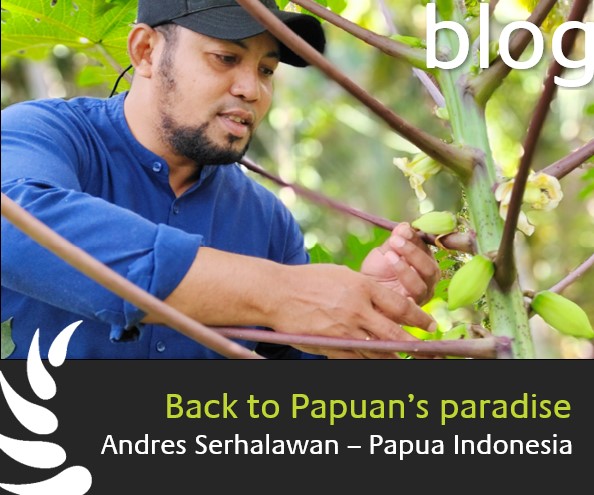Summary
In the past, the Malind community from Papua Indonesia lived in the swampy lowlands and had their own farming system which worked in harmony with nature and was adapted to strong rainfalls, storms, and longer periods of drought. Their way of farming was called Wambad. This system effectively provided all garden produce to meet family needs. The wambad farming system manifested the Marind community's local wisdom by strengthening their relationship with the unpredictable moods of nature. But then colonialists came, and this system was replaced by "modern" farming techniques.
Today, the Wambad system is no longer practiced by the Malind community because of changes in lifestyle and consumption patterns. The Malind community is currently more concerned with product quantity than product quality, and to stimulate the growth rate, non-organic fertilizers are used.
Dahetok Milah (back to the roots) is the name of Andre's organization. Growing up in Papua Indonesia, he will train small-scale farmers in their own old and successful farming methodologies, thus protecting the Papuan environment and the health of indigenous people.
Back to Papuan’s paradise
– By Johan Andres Serhalawan
Fresh air and blue skies, chirping birds, shady trees, and dense forests was the view in my grandma’s village, which is 40 km from Merauke. Spending my school holidays there, felt like living in a different world. That was my childhood experience, a long, long time ago. But now, everything has changed.
In December 2021, I visited the place of my childhood and I saw that the beauty that I used to be there was almost gone. Instead: the air was filled with the sound of chainsaws wailing in the middle of the forest by people cutting down huge trees, the birds we used to hear had disappeared, the dense forest surrounding the village is replaced by rice paddies, and the sago trees that used to line the banks of the river are no longer there because people no longer appreciate sago. Sago, one of the main staple foods of the indigenous Malind people is sacred in the life of the Gebze clan. Now it’s replaced with rice and fast food.
In the past, we could still find deer and wild boars on the outskirts of the village, but now they are all gone. If it continues like this, the city of Merauke will lose its typical animals, that it is so well known for.
Growing up in Merauke on Papua Island, I could observe the increased environmental damage happening in my region. Moreover, when Merauke was designated as the center of the national rice granary, rice fields would be seen in any direction. This, of course, affected the indigenous Marind community. Even in my grandmother’s village, the indigenous people were ‘forced’ to grow rice, and this was even though their small properties were not really suited for growing rice.
I grew up believing that this was the best way to live for the indigenous Malind people. And who doesn’t want a prosperous life? For me, growing rice and focusing on mono-culture was the only way how to step out of poverty. Before coming to kanthari I was convinced that working with huge tractors, with artificial fertilizers and pesticides, is the way to proceed. Surely, in the short term, farmers might increase their income by growing rice, also because it is financially supported by the government. But in the long-term, small-scale farmers as well as the environment lose out. Mono-culture and conventional agriculture lead to depletion and degradation of the topsoil and causes more harm than good. Through interactions with other kanthari participants from Africa and Latin America, through visits to Indian initiatives of regenerative agricultural projects, and through “hot seat-debates”, in which my ideas were questioned, I understood that modern agricultural concepts would not solve poverty for the indigenous people.
And still, I became insecure when my former beneficiaries scolded me saying, “what are you doing in kanthari? Didn’t you promise us modern equipment and a wealthy future? “
I started to reflect and asked myself: Do I have the right to impose the concept of modern agriculture on indigenous farmers? Can I uproot their lives so easily?
My turning point to understand the importance of organic farming was when Sabriye, the co-founder of kanthari, challenged me to look at indigenous people’s ancient and proven agricultural methods. “Shouldn’t they be proud of what they have developed? Isn’t it time to take their traditional ways of farming seriously? isn’t being in harmony with nature something we all should learn from the Papuan farmers for our own future?”
Today, I believe that indigenous Papuans will benefit more when they preserve nature and culture through the cultivation of local and medicinal plants. And by teaching the younger generation of Papuans to continue to apply traditional farming methods or systems that are more focused on environmental conservation.
Papua’s paradise can be re-created if we will preserve the environment and the natural surroundings, stop cutting down trees, take care of wildlife, and we can still be economically well off at the same time.



